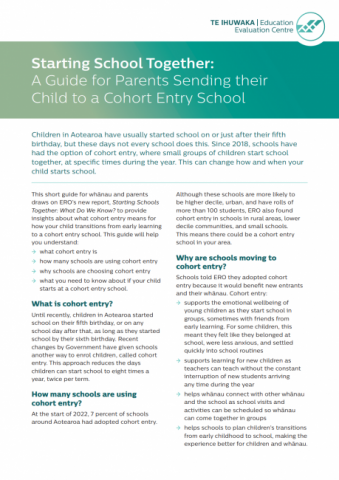Summary
Children in Aotearoa have usually started school on or just after their fifth birthday, but these days not every school does this. Since 2018, schools have had the option of cohort entry, where small groups of children start school together, at specific times during the year. This can change how and when your child starts school.
Whole article:
A Guide for Parents Sending their Child to a Cohort Entry SchoolThis short guide for whānau and parents draws on ERO’s new report, Starting Schools Together: What Do We Know? to provide insights about what cohort entry means for how your child transitions from early learning to a cohort entry school. This guide will help you understand:
- what cohort entry is
- how many schools are using cohort entry
- why schools are choosing cohort entry
- what you need to know about if your child starts at a cohort entry school.
What is cohort entry?
Until recently, children in Aotearoa started school on their fifth birthday, or on any school day after that, as long as they started school by their sixth birthday. Recent changes by Government have given schools another way to enrol children, called cohort entry. This approach reduces the days children can start school to eight times a year, twice per term.
How many schools are using cohort entry?
At the start of 2022, 7 percent of schools around Aotearoa had adopted cohort entry. Although these schools are more likely to be higher decile, urban, and have rolls of more than 100 students, ERO also found cohort entry in schools in rural areas, lower decile communities, and small schools. This means there could be a cohort entry school in your area.
Why are schools moving to cohort entry?
Schools told ERO they adopted cohort entry because it would benefit new entrants and their whānau. Cohort entry:
- supports the emotional wellbeing of young children as they start school in groups, sometimes with friends from early learning. For some children, this meant they felt like they belonged at school, were less anxious, and settled quickly into school routines
- supports learning for new children as teachers can teach without the constant interruption of new students arriving any time during the year
- helps whānau connect with other whānau and the school as school visits and activities can be scheduled so whānau can come together in groups
- helps schools to plan children’s transitions from early childhood to school, making the experience better for children and whānau.
What whānau need to know if their child is starting at a cohort entry school
The best way to find out about how your local school enrols new children is to approach them directly. Schools usually have clear information about their enrolment process on their websites. Alternatively, give them a call. Your child’s early learning service may also know.
To see if there are cohort entry schools in your area, visit Education Counts’ Find a School webpage.
When can your child start school?
Cohort entry means you will have to wait for the next start date before your child can go to school, rather than starting them on their birthday.
There are two start dates per term—one at the start of term and another in the middle. To find out what dates your child can start on, contact the school, your early childhood service, or check the Ministry of Education’s website, here:
https://parents.education.govt.nz/primary-school/your-child-at-school/cohort-entry/
What does this mean for my child’s transition to school?
Because your child will start on a set date during the term, it is likely they will start in a group. This is a good opportunity for them to make new friends and share their experience of starting school with other children who are also new to school.
For you, transition activities and events your child’s school schedules are an opportunity to connect with other parents and whānau in your community. You may also be able to get to know your school and its teachers better.
Talk with your early learning service and local school about what transition activities and information sessions are available. Alternatively, check your local school’s website.
Starting school can be an exciting time, for children and their families. Understanding how your child will start a cohort entry school, and connecting with the school and other whānau, is an opportunity to find out more about your child’s learning, and what you can do to support that moving forward.
